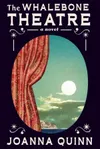Picture a British storyteller who spun a Dorset seaside tale into a Sunday Times bestseller—meet Joanna Quinn! Born in London in 1976, Quinn’s debut novel, The Whalebone Theatre, captured hearts in 2022 with its rich historical tapestry and fierce female protagonist. Her stories, brimming with playful language and deep human insight, mark her as a vibrant new voice in contemporary fiction, reimagining the grand house narrative through a woman’s lens.
The Making of Joanna Quinn
Joanna Quinn’s journey began in London, but at seven, she moved to Dorset’s rolling hills, a landscape that would later inspire her writing. As a child, she penned tales, winning a WH Smith Young Writers Award at 12 for her Dorset-inspired story Kestrel. After studying English Literature at Salford University, Quinn honed her craft through journalism in the West Country and an MPhil in Creative Writing at the University of South Wales. Her early short stories, published in outlets like The White Review and Comma Press, showcased her knack for vivid, experimental prose.
While working for a charity, Quinn pursued a PhD in Creative Writing at Goldsmiths University, where she began crafting The Whalebone Theatre. Despite challenges like redundancy and lockdown homeschooling, her persistence paid off when literary agent Clare Alexander championed the novel, cementing Quinn’s path as a novelist.
Joanna Quinn’s Unforgettable Stories
Quinn’s debut, The Whalebone Theatre, is a sprawling coming-of-age saga set in Dorset, following orphan Cristabel Seagrave. When a whale washes ashore in 1928, Cristabel transforms its bones into a theater, staging imaginative plays with her siblings. As World War II looms, the novel weaves thrilling espionage and heartfelt family dynamics, praised for its granular historical detail and feminist lens. Waterstones called it “a ravishing coming-of-age story.”
Quinn’s short stories, like those in The White Review, explore ordinary moments with experimental flair, often challenging conventional forms. Her second novel, Un mondo perduto, continues her multi-generational storytelling, though less is known about its plot. Her style—playful yet profound—blends humor, historical richness, and a focus on women’s ambitions, setting her apart in historical fiction.
Quinn’s narratives draw from her Dorset roots, evoking the sea and countryside with vivid imagery. Her ability to craft independent, complex female characters, like Cristabel, resonates with readers seeking fresh takes on historical dramas, making her work both accessible and intellectually engaging.
Why Joanna Quinn Matters
Joanna Quinn’s impact lies in her reinvention of the historical novel, centering women’s voices in spaces traditionally dominated by male narratives. The Whalebone Theatre challenges the “Downton Abbey” archetype by focusing on a girl with no claim to her grand house, exploring themes of class, gender, and resilience. Her work inspires readers to reconsider history through marginalized perspectives, earning her a devoted following.
As a creative writing teacher in Dorset, Quinn nurtures new voices, extending her influence beyond the page. Her rise from a small village to literary stardom proves that persistence and imagination can break through, making her a beacon for aspiring writers.
- Born: 1976, London, England
- Key Work: The Whalebone Theatre (2022)
- Awards: WH Smith Young Writers Award (1988)
- Fun Fact: Quinn wrote her debut novel at her dining room table during lockdown!
Snag The Whalebone Theatre and dive into Joanna Quinn’s lush, feminist historical world!
